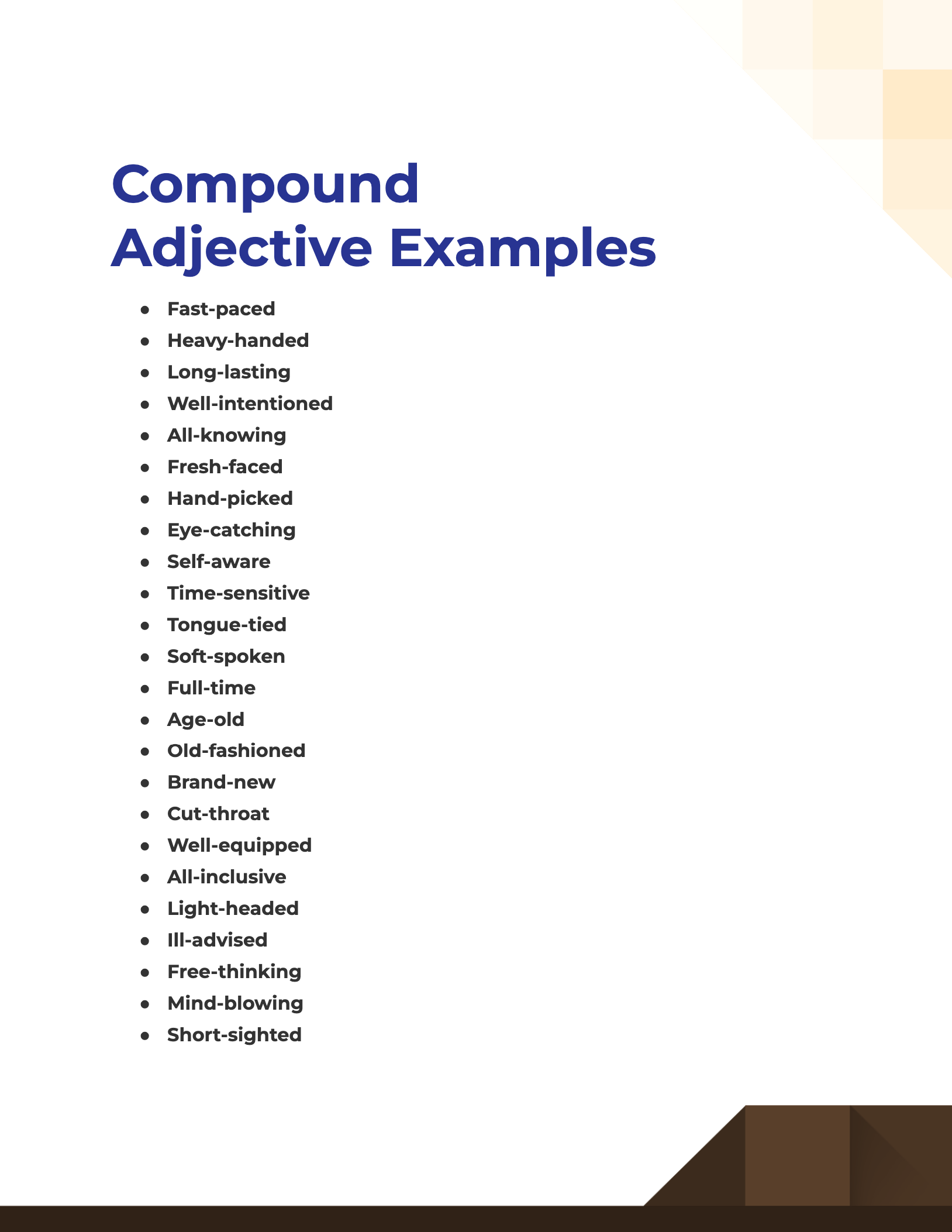99+ Compound Adjective Examples
Compound adjectives are an indispensable part of English language, allowing us to express complex ideas with nuance and clarity. This comprehensive guide will walk you through the intricacies of using compound adjectives, complete with unique adjective examples and easy-to-follow tips.
What is a Compound Adjective? – Definition
A compound adjective is a type of adjective that consists of more than one word, often hyphenated, to better describe a noun. For example, the term “well-known” in the sentence “He is a well-known actor” is a compound adjective that adds depth to the noun ‘actor’.
What is the Best Example of a Compound Adjective?
The best example to illustrate a compound adjective is “ice-cold water”. Here, “ice-cold” is a compound adjective made up of two words, “ice” and “cold”, hyphenated to act as a single descriptive term. It provides a vivid, precise picture of just how cold the water is.
100 Compound Adjective Examples

Delve deeper into the world of compound adjectives with this curated list of 100 unique and distinct examples. Get inspired to enhance your language skills!
- Fast-paced
- Heavy-handed
- Long-lasting
- Well-intentioned
- All-knowing
- Fresh-faced
- Hand-picked
- Eye-catching
- Self-aware
- Time-sensitive
- Tongue-tied
- Soft-spoken
- Full-time
- Age-old
- Old-fashioned
- Brand-new
- Cut-throat
- Well-equipped
- All-inclusive
- Light-headed
- Ill-advised
- Free-thinking
- Mind-blowing
- Short-sighted
- Heart-wrenching
- Kind-hearted
- Self-employed
- High-flying
- Low-key
- Never-ending
- Hard-hitting
- Quick-witted
- Bad-tempered
- Up-to-date
- Laid-back
- Long-term
- Narrow-minded
- Last-minute
- Deep-rooted
- Ever-changing
- Budget-friendly
- Hair-raising
- Easy-going
- High-speed
- World-renowned
- Far-reaching
- Well-spoken
- Middle-aged
- Well-dressed
- Two-faced
- Worry-free
- High-risk
- Long-distance
- Family-oriented
- Small-scale
- Low-cost
- Second-hand
- Far-off
- Hot-headed
- Cold-blooded
- Child-friendly
- Over-the-top
- User-friendly
- Cold-hearted
- Good-natured
- Bright-eyed
- Short-term
- Thick-skinned
- Non-stop
- Sweet-smelling
- Down-to-earth
- All-out
- Clean-cut
- Hard-working
- Early-morning
- High-quality
- Full-blown
- Custom-built
- Single-handed
- Long-standing
- Open-minded
- Self-contained
- High-level
- Close-knit
- Self-made
- Ground-breaking
- Up-and-coming
- Good-looking
- Self-sufficient
- Mouth-watering
- Out-of-date
- Top-of-the-line
- Far-fetched
- Hard-to-find
- Under-the-weather
- True-blue
- Weak-kneed
- Lily-livered
- Loose-lipped
- Awe-inspiring
Compound Adjective Sentence Examples
Here are the compelling sentences that feature compound adjectives
- The fast-paced city life leaves me breathless.
- His heavy-handed approach to management was not well-received.
- She gave him a long-lasting impression on their first date.
- His well-intentioned advice ended up causing more harm than good.
- The all-knowing oracle predicted the outcome of the war.
- The fresh-faced recruit was eager to learn.
- The hand-picked flowers were a hit at the party.
- The eye-catching billboard drew lots of customers to the new restaurant.
- She is self-aware enough to recognize her own faults.
- Please complete this time-sensitive task by the end of the day.
How to Use Compound Adjectives? – Expanded Step by Step Guide
Step 1: Identify the Noun
Your first task is to identify the noun you intend to modify. Is it a person, place, thing, or idea? Knowing your target noun will guide your choice of compound adjectives.
Step 2: Choose the Right Words
The next step is to select the individual words that will form your compound adjective. Consider the message you want to convey and the tone you want to set.
Step 3: Use a Hyphen or Not?
In most cases, you’ll need to hyphenate the words to form your compound adjective. However, common phrases like “real estate” may not require a hyphen when used adjectivally, e.g., “real estate agent.”
Step 4: Placement
Compound adjectives usually precede the noun they modify, especially if you want to focus the reader’s attention on a particular aspect of that noun.
Step 5: Double Check Context
Always look at the sentence as a whole to ensure that the compound adjective is serving its purpose and not causing any confusion.
Step 6: Use Sparingly
Compound adjectives are powerful, but using too many can make your text confusing or harder to read. Use them where they can make the most impact.
Step 7: Proofread
A final proofreading step ensures that you’ve spelled everything correctly, and that your hyphens are in place.
Step 8: Peer Review
If possible, have someone else read your work to make sure that your compound adjectives are effective and properly used.
Tips for Using Compound Adjectives
- Be Consistent: Once you decide to hyphenate, stick to it throughout your text.
- Avoid Redundancy: Use compound adjectives that add value and avoid ones that are redundant.
- Check Spelling: Always double-check the spelling, especially the hyphenation.
- Read Aloud: Reading your text aloud can help you identify where compound adjectives would be most effective.
Master the art of using compound adjectives to enrich your vocabulary and make your sentences more descriptive and engaging.



